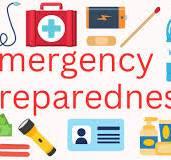The Crucial Importance of Emergency Preparedness: Are You Ready for the Unexpected?
Stanley Bangani![]() Invalid date
4 minutes, 9 seconds
Invalid date
4 minutes, 9 seconds
379 views 3 Likes
Introduction:
In a world filled with uncertainties, the importance of emergency preparedness cannot be overstated. Whether it's a natural disaster, a sudden health crisis, or unforeseen events, being prepared can make the difference between chaos and a managed response. In this blog, we will explore the significance of emergency preparedness and why it should be a priority for individuals, families, and communities.
Mitigating Risks and Minimizing Impact:
Mitigating risks and minimizing the impact of unforeseen circumstances are among the key objectives in emergency preparedness. By identifying potential hazards and understanding the risks associated with them, individuals and communities can take proactive measures to reduce vulnerabilities. This can involve everything from securing homes against natural disasters to having evacuation plans in place.
Preserving Lives and Guaranteeing Safety:
During unexpected emergencies, time becomes crucial. Having a well-thought-out emergency plan can be the key to protecting lives and ensuring the safety of yourself and your loved ones. One must be aware of evacuation routes, establish communication protocols and have emergency supplies easily accessible. Preparedness not only saves lives but also facilitates a more organized and efficient response to emergencies.
Building Resilience:
Emergency preparedness goes hand-in-hand with building resilience. Resilient individuals and communities are better equipped to bounce back from adversity. Through preparedness, people can develop the skills and mindset necessary to adapt to changing circumstances, recover from setbacks, and rebuild in the aftermath of an emergency.
Collaborating and engaging with the community.:
Engagement and collaboration within the community are nurtured through emergency preparedness.. When individuals and communities come together to plan and prepare for emergencies, it creates a network of support. This collaboration ensures that resources are shared, information is disseminated efficiently, and assistance is provided where it is needed most.
Reducing the Strain on Emergency Services:
During large-scale emergencies, emergency services may be stretched thin. By being prepared, individuals can take some of the burden off these services. Basic first aid knowledge, the ability to assess and respond to immediate threats, and having essential supplies can make a significant difference in the early stages of an emergency, allowing professional responders to focus on more critical issues.
Financial Protection:
The financial impact of emergencies can be substantial. From property damage to medical expenses, emergencies can quickly lead to financial strain. Emergency preparedness can help mitigate these costs by safeguarding assets, having insurance coverage in place, and ensuring that financial plans include provisions for unexpected events.
Conclusion:
In a world where uncertainties are inevitable, the importance of emergency preparedness cannot be emphasized enough. It is not a matter of if an emergency will occur, but when. Taking the time to plan, equip, and train for emergencies can mean the difference between chaos and controlled response, between vulnerability and resilience. By making preparedness a priority, individuals and communities can face the unexpected with confidence, knowing that they are ready to navigate the challenges that may arise.
image source:https://www.linkedin.com/pulse/emergency-preparedness-being-ready-unexpected-m%C3%A1rio-lan%C3%A7a

